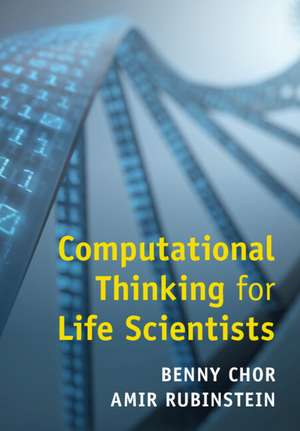Computational Thinking for Life Scientists
Autor Benny Chor, Amir Rubinsteinen Limba Engleză Paperback – 7 sep 2022
| Toate formatele și edițiile | Preț | Express |
|---|---|---|
| Paperback (1) | 230.57 lei 3-5 săpt. | +16.57 lei 7-13 zile |
| Cambridge University Press – 7 sep 2022 | 230.57 lei 3-5 săpt. | +16.57 lei 7-13 zile |
| Hardback (1) | 583.36 lei 3-5 săpt. | |
| Cambridge University Press – 7 sep 2022 | 583.36 lei 3-5 săpt. |
Preț: 230.57 lei
Nou
Puncte Express: 346
Preț estimativ în valută:
44.12€ • 46.31$ • 36.62£
44.12€ • 46.31$ • 36.62£
Carte disponibilă
Livrare economică 20 martie-03 aprilie
Livrare express 06-12 martie pentru 26.56 lei
Preluare comenzi: 021 569.72.76
Specificații
ISBN-13: 9781316647592
ISBN-10: 1316647595
Pagini: 216
Dimensiuni: 169 x 244 x 10 mm
Greutate: 0.43 kg
Ediția:Nouă
Editura: Cambridge University Press
Colecția Cambridge University Press
Locul publicării:Cambridge, United Kingdom
ISBN-10: 1316647595
Pagini: 216
Dimensiuni: 169 x 244 x 10 mm
Greutate: 0.43 kg
Ediția:Nouă
Editura: Cambridge University Press
Colecția Cambridge University Press
Locul publicării:Cambridge, United Kingdom
Cuprins
Introduction; Part I. Programming in Python: 1. Crash introduction to python; 2. Efficiency matters – gentle intro to complexity; Part II. Sequences: 3. Sets dictionaries and hashing; 4. Regular expressions and biological patterns; Part III. Networks: 5. Basic notions in graph theory; 6. Shortest paths and breadth first search; 7. Simulation of regulatory networks; Part IV. Images: 8. Digital images representation; 9. Image processing; Part V. Limitations of Computing: 10. Mission impossible; 11. Mission infeasible; Index.
Recenzii
'An excellent and very gentle introduction to bioinformatics for biologists. In contrast to books that focus on algorithms and ignore programming or focus on programming without explaining algorithms, this book is a perfect blend of both algorithms and programming!' Pavel Pevzner, Ronald R. Taylor Chair and Distinguished Professor of Computer Science, University of California at San Diego
'The ability to extract quantitative information from data is an essential skill for the modern biologist. In order to maximize the benefit of programming, use of existing computational tools and effective collaboration with computational scientists, biologists must be able to 'think computationally' by gaining a more algorithmic and logical thinking. In their book, Benny Chor and Amir Rubinstein introduce fundamental computational concepts to life sciences students. Each chapter covers a distinct computational idea motivated by a concrete biological challenge. Questions embedded throughout each chapter and code examples provide hands-on practice. Similarly to the way in which chemistry is perceived as being essential to the biology curriculum, computational thinking should also be considered a part of the modern biologist's basic training. This excellent book is essential reading for undergraduate life sciences students.' Assaf Zaritsky, Ben-Gurion University of the Negev, Israel
'The ability to extract quantitative information from data is an essential skill for the modern biologist. In order to maximize the benefit of programming, use of existing computational tools and effective collaboration with computational scientists, biologists must be able to 'think computationally' by gaining a more algorithmic and logical thinking. In their book, Benny Chor and Amir Rubinstein introduce fundamental computational concepts to life sciences students. Each chapter covers a distinct computational idea motivated by a concrete biological challenge. Questions embedded throughout each chapter and code examples provide hands-on practice. Similarly to the way in which chemistry is perceived as being essential to the biology curriculum, computational thinking should also be considered a part of the modern biologist's basic training. This excellent book is essential reading for undergraduate life sciences students.' Assaf Zaritsky, Ben-Gurion University of the Negev, Israel
Notă biografică
Descriere
Introduces fundamental computational ideas and concepts in a biological context, with real-world examples and exercises in Python.
